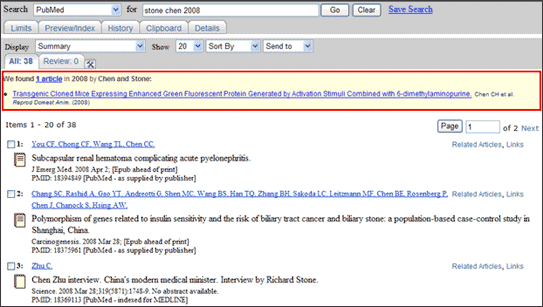
PubMed has been modified frequently over the years to optimize retrieval or provide features that lead searchers to additional information. PubMed is undergoing two changes which continue this trend. One change is in the way Automatic Term Mapping (ATM) works and the other is a new feature called Citation Sensor.
The Automatic Term Mapping feature was developed to enable PubMed to recognize author names, journal titles, and MeSH vocabulary terms that are used in searches without search tags. In the past when an author name or journal title was the same as a MeSH term, ATM performed a subject search. This caused many searches to fail – especially those looking for a specific article.
For example, a search using citation data: Burns 2005 31 145, where Burns is the journal title, fails with old ATM because "burns" mapped to a MeSH heading and Text Word search of that word. To address this problem, Automatic Term Mapping has been modified to make it more inclusive. With new ATM, the same search retrieves the record in PubMed for the article in Burns.
The MeSH and journals translations of new ATM have been augmented to include “All Fields” searching. Individual words are searched using the All Fields search tag, and, in the case of multi-word terms, those words are ANDed together. This broadens the search considerably by including citations with relevant terms that are not retrieved using old ATM.
For example, with new ATM a search for gene therapy can retrieve an in process record with the phrase, “…clinical application of gene silencing therapy…” which is not retrieved with old ATM. New ATM also searches multi-word terms with the All Fields tag. This allows retrieval of journal names which can only be retrieved using the complete name or abbreviation. It’s a good idea to check Details to verify how your terms have been translated. New ATM retrieves more citations than old ATM and searchers may notice more citations in the retrieval (and saved search updates) that are not of interest.

Citation Sensor is a new PubMed feature that matches searches with citations. It recognizes combinations of search terms that are characteristic of citation searching, e.g., volume/issue numbers, author names, journal titles, and publication dates, which it then matches to citations. If your search invokes the Citation Sensor, you will see a yellow area above the retrieval with links to one or more citations for your consideration. Please note: the Citation Sensor will not work with terms entered with search tags, e.g., chen [au].
For more information about these and other new PubMed features, visit: http://www.ncbi.nlm.nih.gov/feed/rss.cgi?ChanKey=PubMedNews
For instruction about this and other advanced searching techniques in PubMed, sign up for our July 16 PubMed Advanced Workshop.










